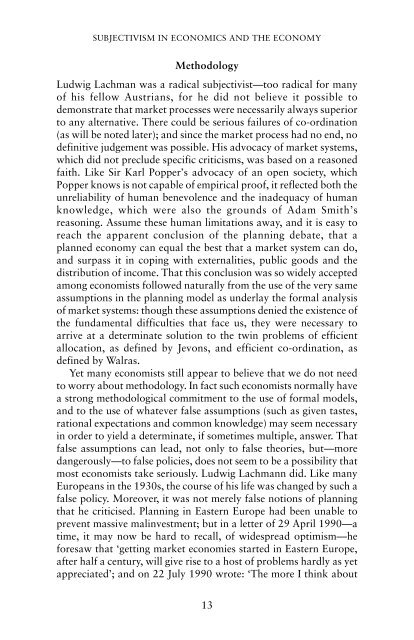Subjectivism and Economic Analysis: Essays in memory of Ludwig ...
Subjectivism and Economic Analysis: Essays in memory of Ludwig ...
Subjectivism and Economic Analysis: Essays in memory of Ludwig ...
Create successful ePaper yourself
Turn your PDF publications into a flip-book with our unique Google optimized e-Paper software.
SUBJECTIVISM IN ECONOMICS AND THE ECONOMYMethodology<strong>Ludwig</strong> Lachman was a radical subjectivist—too radical for many<strong>of</strong> his fellow Austrians, for he did not believe it possible todemonstrate that market processes were necessarily always superiorto any alternative. There could be serious failures <strong>of</strong> co-ord<strong>in</strong>ation(as will be noted later); <strong>and</strong> s<strong>in</strong>ce the market process had no end, nodef<strong>in</strong>itive judgement was possible. His advocacy <strong>of</strong> market systems,which did not preclude specific criticisms, was based on a reasonedfaith. Like Sir Karl Popper’s advocacy <strong>of</strong> an open society, whichPopper knows is not capable <strong>of</strong> empirical pro<strong>of</strong>, it reflected both theunreliability <strong>of</strong> human benevolence <strong>and</strong> the <strong>in</strong>adequacy <strong>of</strong> humanknowledge, which were also the grounds <strong>of</strong> Adam Smith’sreason<strong>in</strong>g. Assume these human limitations away, <strong>and</strong> it is easy toreach the apparent conclusion <strong>of</strong> the plann<strong>in</strong>g debate, that aplanned economy can equal the best that a market system can do,<strong>and</strong> surpass it <strong>in</strong> cop<strong>in</strong>g with externalities, public goods <strong>and</strong> thedistribution <strong>of</strong> <strong>in</strong>come. That this conclusion was so widely acceptedamong economists followed naturally from the use <strong>of</strong> the very sameassumptions <strong>in</strong> the plann<strong>in</strong>g model as underlay the formal analysis<strong>of</strong> market systems: though these assumptions denied the existence <strong>of</strong>the fundamental difficulties that face us, they were necessary toarrive at a determ<strong>in</strong>ate solution to the tw<strong>in</strong> problems <strong>of</strong> efficientallocation, as def<strong>in</strong>ed by Jevons, <strong>and</strong> efficient co-ord<strong>in</strong>ation, asdef<strong>in</strong>ed by Walras.Yet many economists still appear to believe that we do not needto worry about methodology. In fact such economists normally havea strong methodological commitment to the use <strong>of</strong> formal models,<strong>and</strong> to the use <strong>of</strong> whatever false assumptions (such as given tastes,rational expectations <strong>and</strong> common knowledge) may seem necessary<strong>in</strong> order to yield a determ<strong>in</strong>ate, if sometimes multiple, answer. Thatfalse assumptions can lead, not only to false theories, but—moredangerously—to false policies, does not seem to be a possibility thatmost economists take seriously. <strong>Ludwig</strong> Lachmann did. Like manyEuropeans <strong>in</strong> the 1930s, the course <strong>of</strong> his life was changed by such afalse policy. Moreover, it was not merely false notions <strong>of</strong> plann<strong>in</strong>gthat he criticised. Plann<strong>in</strong>g <strong>in</strong> Eastern Europe had been unable toprevent massive mal<strong>in</strong>vestment; but <strong>in</strong> a letter <strong>of</strong> 29 April 1990—atime, it may now be hard to recall, <strong>of</strong> widespread optimism—heforesaw that ‘gett<strong>in</strong>g market economies started <strong>in</strong> Eastern Europe,after half a century, will give rise to a host <strong>of</strong> problems hardly as yetappreciated’; <strong>and</strong> on 22 July 1990 wrote: ‘The more I th<strong>in</strong>k about13

















